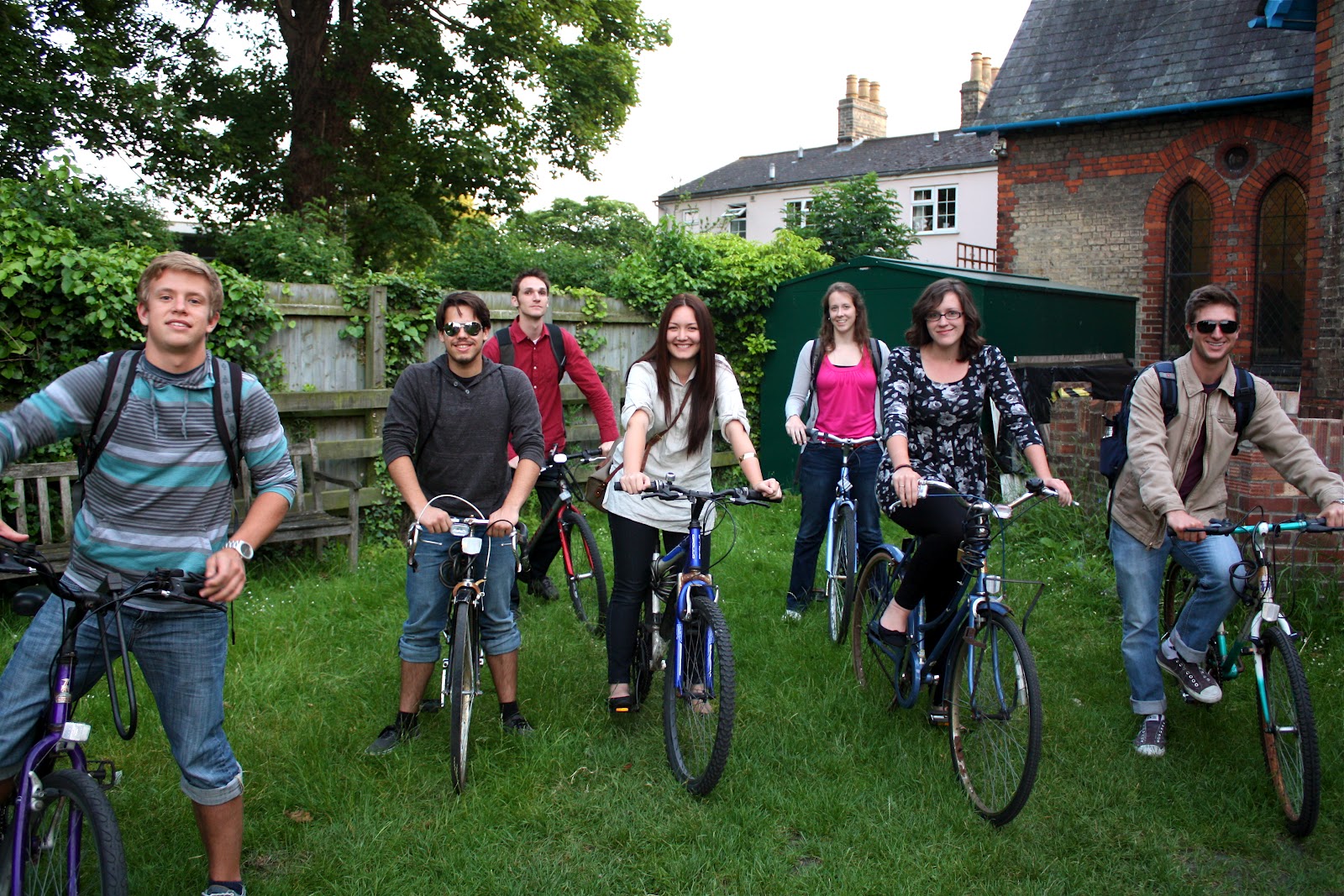
Torrey Cambridge arrives at their destination and heads out for a bike ride around the city. | Laura Flemming/THE CHIMES
Correction: The Chimes corrected various minor mistakes. The Chimes regrets this error.
Summer break provides the opportunity for Biola students to pack their bags and travel to other countries for the purpose of spreading the gospel, a task for which Biola University’s Student Missionary Union often mobilizes students. However, other Biola-affiliated groups organized mission trips this past summer as well, including the Torrey Honors Institute and the California School Project.
Audience members engage Torrey team in dialoguing about Christ
A team of seven Torrey students participating in Torrey Cambridge went two weeks before their normal arrival in order to put on a mission trip aimed at the approximately 12,000 international students who travel to Cambridge, England each summer, according to team leader and junior psychology major Sean Hansen. The team was challenged by Cambridge International Outreach to try American ministry activities that the British people might find unconventional, such as sports, drama and music ministries, as well as personal witness surveys, Hansen said.
“We put on a Jesus Film showing, and just because the way the city’s set up and the students’ [busy] schedules, as a team leader I was expecting probably five to six people to show up,” Hansen said.
To his surprise, close to 40 attended and stayed throughout the two-and-a-half-hour duration of the film.
“As soon as the credits started playing, [three Islamic men] turned to one of my team members and started firing questions off about Christ,” Hansen said. “It was absolutely incredible.”
The Torrey team aimed to be gospel-centered and saw that the best approach to witnessing was relational.
“Everything we did in Cambridge was to build up relationships either with international students, the locals, or with the ministries and churches, so that the gospel could be further presented to the people,” Hansen said. “Sometimes that meant actually witnessing to someone. … Sometimes that meant never talking about God, but being able to start a friendship.”
Many of their members had prior experience with evangelism events on local high school campuses and knew how to answer the tough questions, according to Hansen.
“It was quite a bit harder to talk to the locals than the international students,” Hansen said. “The international students were there to learn about new things, to experience other cultures, so being able to present the gospel in that kind of a way was really easy.”
Most of their energy was focused on the international students, but, as Hansen concluded, “[We] learned to love the people [of England] and love their ways.”
As the Torrey team spent time serving the international students in Cambridge, the California School Project sponsored a three-week mission trip to Peru where students backpacked through the Andes Mountains, stopping at a different remote village each day.
Students bring gospel to Quechua people in Peru
Wycliffe Bible Translators and The Good News Association in Peru recently completed a translation of the New Testament in Quechua, an indigenous Peruvian language. The CSP team brought this translated New Testament into the remote areas to reach the specific people group there.
Senior philosophy major Kolby Atchison, leader of the CSP team, enjoyed the opportunity to share the gospel in the Quechua language with the aid of a translator.
Seeing the diversity in all of the people’s faces, Atchison said he realized that the gospel was going as far as Peru, all the way from where it started in Jerusalem.
A typical day for the team included traveling to a village, getting to know the people, playing with the children, delivering copies of the New Testament translation, and sharing a gospel message with the Quechuas. The message was one that most of the people had never heard before.
“[The village is] so remote, there’s no priests out there, no church services,” Atchison said. “They don’t know much [about the gospel].”
The team saw it as a priority to make their short time in each village matter by explicitly sharing the gospel, Atchison said.
“One of the coolest things we did was show the Jesus Film in the Quechua language,” Atchison said.
Additionally, the team gave each family a copy of the New Testament translated into the native Quechua tongue.
“One thing I learned on the trip is that there’s something about reading the Bible in your first language, your cultural language. I believe it’s important for people to read God’s word in the language they grew up speaking,” Atchison said.
For Atchison, the most impactful part of the trip was seeing the gospel proclaimed, even in remote parts of the Andes mountains.
“I think just the coolest thing was getting to share that the God of the universe revealed himself through the man Jesus Christ … and wants a relationship with these people. God loves them so much that he wanted to send us to them purposely,” Atchison said. “God has the Northern Quechuas on his heart.”







